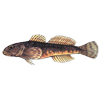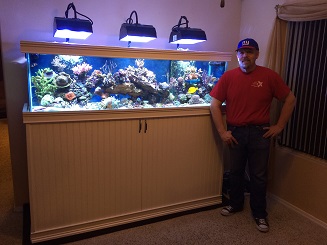| Author |
 Topic Search Topic Search  Topic Options Topic Options
|
Mark Peterson 
Paid Member


Joined: June 19 2002
Location: Murray
Status: Offline
Points: 21436
|
 Post Options Post Options
 Thanks(0) Thanks(0)
 Quote Quote  Reply Reply
 Topic: Better foods and feeding methods? Topic: Better foods and feeding methods?
Posted: December 16 2013 at 10:24am |
Aloha, Some here may have heard me say this before but...feel free to chime in on this discussion. I'll start out by giving my opinions on the matter: It's not necessary to feed more frequently than 1x/day. <edit> I have found this to be true for most fish in my systems where I seem to grow more live natural food than in the average hobbyist tank. Fish have stomachs
that expand so they can take in as much as possible when the food is
available. In nature food sometimes comes in "waves". (no pun intended) Weather conditions
may prevent fish from eating for days while they hide during the storm.
Their bodies are built to handle feast and famine. Fish should
also be picking on food that is growing in the tank. Tangs grazing on
algae growing on rocks and surfaces is an obvious example of this. Bugs
on the rocks, in the sand and in the water column at dawn, dusk and
through the night are a good source of food in a reef aquarium, just as
they are on the wild reef. Creating the tank conditions which provide
this food is very important in my opinion. Here are some of the techniques I use for creating these conditions: - feeding microfoods (Frozen Cyclops and Golden Pearls) after lights out and/or occasionally in the middle of the night (not every night  ) - choosing *natural foods (95%) over dry processed foods - growing macroalgae (Caulerpa) in the display - feeding phytoplankton (algae paste, because growing my own is a hassle) - overfeeding often (light and then heavy at different times) - fasting occasionally *Regarding natural/raw foods vs processed dry foods: Natural
foods last longer in the water, not losing flavor and nutrients like dry foods. Natural foods feed all sizes of animals all day
long. Natural foods have more complete nutrients and bulk. I once
visited a
plant where dry foods are made -> YUK. That experience strengthened my preference to feed frozen
and fresh
foods. I'm open for discussion. Mahalo, Mark 
Edited by Mark Peterson - February 04 2014 at 3:41pm
|
Reefkeeping Tips, & quick, easy setup tricks:www.utahreefs.com/forum/forum_posts.asp?TID=9244 Pay it forward - become a paid WMAS member 
|
 |
Mike Savage 
Guest


Joined: July 15 2005
Location: Murray
Status: Offline
Points: 19173
|
 Post Options Post Options
 Thanks(0) Thanks(0)
 Quote Quote  Reply Reply
 Posted: December 16 2013 at 10:56am Posted: December 16 2013 at 10:56am |
Maybe I don't understand your discussion fully but I disagree that feeding once per day is adequate to maintain health in all living organisms in our tank. Some fish need to eat weekly (or less often) and others feed frequently or constantly such as Anthias, Dragonets, Seahorses, Pipefish etc.
Upon reading your post over maybe I just need to know what you mean by "natural foods"
I feed mostly frozen and live foods but I think there are some excellent dry foods on the market now.
Edited by Mike Savage - December 16 2013 at 10:57am
|
|
|
 |
ReefdUp 
Guest


Joined: March 20 2011
Location: South Weber
Status: Offline
Points: 4166
|
 Post Options Post Options
 Thanks(0) Thanks(0)
 Quote Quote  Reply Reply
 Posted: December 16 2013 at 11:20am Posted: December 16 2013 at 11:20am |
|
I somewhat disagree. The prevalence of internal parasites in captive fish is much higher than in wild fish. I would argue that this would cause some fish to require more frequent feedings.
Even though all my fish were treated for internal parasites, I still break up my feedings over the course of a day when I remember.
|
|
www.reefdup.com
Diving since 2009, reefkeeping since 2007, & fishkeeping since 1987
200g, 75g, & 15g Systems
PADI Advanced Open Water
|
 |
love2skiutah 
Guest


Joined: May 25 2012
Location: Centerville
Status: Offline
Points: 1229
|
 Post Options Post Options
 Thanks(0) Thanks(0)
 Quote Quote  Reply Reply
 Posted: December 16 2013 at 12:44pm Posted: December 16 2013 at 12:44pm |
I try to feed 3-5 times a day in small portions.
I feel that they are healthier, colored better and the aggression isn't as bad. I do think it's better to feed fresh and frozen, but those spectrum pellets are pretty awesome. My fish colored up so well when I added them to their diet.
|
 |
Sculpin 
Guest


Joined: May 16 2008
Location: Kaysville
Status: Offline
Points: 1480
|
 Post Options Post Options
 Thanks(0) Thanks(0)
 Quote Quote  Reply Reply
 Posted: December 16 2013 at 6:10pm Posted: December 16 2013 at 6:10pm |
Feeding requirements in general all depends on how populated and what kind of species your tank has. There is no single rule to follow. I had a 30 gallon nano that I almost never fed (I would go several months between feeding). That said I had only 2 fish- a clownfish and a watchmen goby. The food the tank provided was enough to sustain them indefinitely, however if I were to add a fish someone would inevitably die unless I offset with feeding.
In a much larger tank of mine I recently bought an autofeeder by Neptune that could be control by my Apex and I started feeding small amounts 5 times a day. So far the fish seem fat and happy and they eat every pellet that drops in the tank. I've known in the past when I've tried to only feed once or twice a week my tangs would be at each others throats and the smaller less aggressive fish would look anemic.
That said, there was plenty of algae in the tank the tangs could of likely feed on so I'm pretty sure I created their dependency on dry food. In the best of circumstances I think feeding several times a day with several different fresh foods targeted to your various fish population would have the best results.
In my time snorkeling and diving it seems like salt water fish are always on the move and always trying to eat more food (well during the day time at least) and the amount of water and ground they have to feed from in relation to their population is staggering. If we were to box up a 6'x3'x3' box of reef we would be extremely lucky if we even got a single fish so logic would suggest that if not for supplemental feeding our fish would likely starve.
Micah
|
|
|
 |
Mark Peterson 
Paid Member


Joined: June 19 2002
Location: Murray
Status: Offline
Points: 21436
|
 Post Options Post Options
 Thanks(0) Thanks(0)
 Quote Quote  Reply Reply
 Posted: January 24 2014 at 7:20am Posted: January 24 2014 at 7:20am |
Yesterday I visited a WMAS member and saw his tank. The situation in his nano reminded me of the value of natural foods. The dry pellets label says that twice a day feeding is required. Why do many hobbyist tanks/fish, including mine, do well with once a day feeding  Because dry processed foods are so easily digested that their nutrition is quickly expended. Natural foods are digested slower. This provides nutrients for many
more hours than the easily/quickly digested dry processed foods. Fish are more likely to pick at coral when they are missing the longer lasting nutrition of natural foods. Why do so many tanks get fed dry processed foods  Maybe it's because of simple convenience.
|
Reefkeeping Tips, & quick, easy setup tricks:www.utahreefs.com/forum/forum_posts.asp?TID=9244 Pay it forward - become a paid WMAS member 
|
 |
love2skiutah 
Guest


Joined: May 25 2012
Location: Centerville
Status: Offline
Points: 1229
|
 Post Options Post Options
 Thanks(0) Thanks(0)
 Quote Quote  Reply Reply
 Posted: January 24 2014 at 11:11am Posted: January 24 2014 at 11:11am |
I personally, have gone away from dry foods in the last few months (besides nori) and stuck with frozen and all the ROE refrigerated stuff. Every once in awhile I'll throw in some flakes and pellets cause sometime you don't have the time and you are in a hurry.
And Mark, what you're saying sounds like it makes sense, but how do you really know all this? How do you know dry foods digest slower and natural foods are better have longer lasting nutrition? I would love to actually read up on that from someone who has extensive knowledge and has done research on nutrition.
|
 |
JohnnyHeavens 
Guest

Joined: January 02 2013
Location: Riverton
Status: Offline
Points: 733
|
 Post Options Post Options
 Thanks(0) Thanks(0)
 Quote Quote  Reply Reply
 Posted: January 24 2014 at 11:42am Posted: January 24 2014 at 11:42am |
|
Pellets take longer to digest? Do they? I put mysis in my tank and if no one eats it (we are pretending here) it sits for quite some time as it breaks down. I drop pellets in and in minutes to an hour at most and it has broken down to invisible. I know this isn't digestion but that is a huge difference in solubility if nothing else.
|
|
@Home
300g System 150g-Cube Reef+60g Frag+WaterChange
150g Tall FOWLR RIP
@Work RSM 130D w/LEDs
txt anytime @ eightO1-seven5five-eighteen99
Scuba! PADI Pro DM/AI/TecDeep
NSS/CDS-Full Cave Diver
|
 |
love2skiutah 
Guest


Joined: May 25 2012
Location: Centerville
Status: Offline
Points: 1229
|
 Post Options Post Options
 Thanks(0) Thanks(0)
 Quote Quote  Reply Reply
 Posted: January 24 2014 at 11:44am Posted: January 24 2014 at 11:44am |
|
I meant to say "How do you know dry foods digest faster" sorry lol
|
 |
JohnnyHeavens 
Guest

Joined: January 02 2013
Location: Riverton
Status: Offline
Points: 733
|
 Post Options Post Options
 Thanks(0) Thanks(0)
 Quote Quote  Reply Reply
 Posted: January 24 2014 at 11:54am Posted: January 24 2014 at 11:54am |
 love2skiutah wrote: love2skiutah wrote:
I meant to say "How do you know dry foods digest faster" sorry lol |
I could have figured that out if I waas smarter
|
|
@Home
300g System 150g-Cube Reef+60g Frag+WaterChange
150g Tall FOWLR RIP
@Work RSM 130D w/LEDs
txt anytime @ eightO1-seven5five-eighteen99
Scuba! PADI Pro DM/AI/TecDeep
NSS/CDS-Full Cave Diver
|
 |
Mark Peterson 
Paid Member


Joined: June 19 2002
Location: Murray
Status: Offline
Points: 21436
|
 Post Options Post Options
 Thanks(0) Thanks(0)
 Quote Quote  Reply Reply
 Posted: February 04 2014 at 3:25pm Posted: February 04 2014 at 3:25pm |
Aloha, If all it takes is water for that dry food to break down, just imagine how fast it breaks down in the fish digestive system. I have learned a lot about nutrition from my wife. This principle of natural/raw foods vs processed foods is old news to people like her that are nutritionally informed. Whatever may be said about new dry pellet fish food being superior, it is still the same dry processed food. It is popular because it is easy, but being popular to hobbyists does not make it better for fish. Moving on... Many of the fish we keep are Carnivores. Wrasse are the largest group of carnivores most hobbyists keep. Many of us have seen bug populations diminish or even disappear after adding a Wrasse or Mandarin to our systems.  So how do we grow those bugs to give our fish that natural meaty food? There
are several keys to keeping robust bug populations some of which was mentioned in the OP. 1. One key is to feed
microfoods. I feed frozen Cyclops and 50-100 Micron size Golden
Pearls at night and about once/week the system gets some
phytoplankton(in the form of Tahitian Blend Algae Paste). 2. Another key is
to feed the fish mostly on frozen meaty foods. Feed the entire cube,
including the liquid and small particles that come in that frozen cube.
3. Last but not least, a third key is explained in the article Herbivores vs. Carnivores found here: http://www.utahreefs.com/SeaStar/SeaStarJunePrint.pdfWhy
just this morning I emptied and replaced a bag of Activated Alumina PO4 remover and a
bunch of Amphipods rolled out. Others were clinging to the sides of the
bag. This bag is a fine mesh, yet there were at least a dozen Amphipods
inside the bag with the media. The only way this could be is that they went inside as
larvae ~3 weeks ago and grew up inside. What this also means is that
there were hundreds of Copepods inside the bag. Copepods are nearly
microscopic. I couldn't see them with my naked eye as I emptied the bag, but I am certain they
are there. Why? Because using a magnifying glass, I see many kinds of bugs all the time where the sand meets the glass. This idea that larvae are being moved along in the current and landing on a bag of filtration media can be seen as a clue as to what might be going on in our tank, especially at night. Bugs can avoid predation by being nocturnal. That is why it's good to feed micro sized foods at night. It's not so hard. Just before we hit the sack, drop in some frozen Cyclops, Oyster Eggs and/or Golden Pearls. Yes, I know. Golden Pearls are simply dry pelletized food. What can I say.  My pillow is calling to me. 
|
Reefkeeping Tips, & quick, easy setup tricks:www.utahreefs.com/forum/forum_posts.asp?TID=9244 Pay it forward - become a paid WMAS member 
|
 |
Adam Blundell 
Presidency


Joined: June 24 2002
Location: Davis County
Status: Offline
Points: 18526
|
 Post Options Post Options
 Thanks(0) Thanks(0)
 Quote Quote  Reply Reply
 Posted: February 04 2014 at 6:12pm Posted: February 04 2014 at 6:12pm |
Will always be a debate but there are certainly lots and lots of really smart people who think pellet food is the best food out there. Then again lots and lots super tanks use frozen foods (I'm kind of in favor of rinsing the food), and tons of people use foods from the grocery store seafood section.
Getting foods that your fish will eat, that is the real goal.
Adam |
|
Come to a meeting, they’re fun!
|
 |
BobC63 
Admin Group


Joined: January 17 2007
Location: Lehi, UT
Status: Offline
Points: 8972
|
 Post Options Post Options
 Thanks(0) Thanks(0)
 Quote Quote  Reply Reply
 Posted: February 04 2014 at 6:58pm Posted: February 04 2014 at 6:58pm |
Mark secretly feeds his fish granola at night when no one is looking 
(But you didn't hear that from me  )
Edited by BobC63 - February 04 2014 at 7:07pm
|
|
- My Current Tank: 65g Starfire (sitting empty for 2+ years) -
* Marine & Reef tanks since 1977 *
|
 |
BobC63 
Admin Group


Joined: January 17 2007
Location: Lehi, UT
Status: Offline
Points: 8972
|
 Post Options Post Options
 Thanks(0) Thanks(0)
 Quote Quote  Reply Reply
 Posted: February 04 2014 at 7:06pm Posted: February 04 2014 at 7:06pm |
OK, jokes aside, I feed my fish once a day; however, I do this mainly out of lack of me being home to feed more than once a day. And since I only feed once a day, I feed one large 'meal' instead of, say, 3 or 4 smaller feedings per day. If I was home all day, every day, I would probably feed 4 small feedings per day.
I also think that you should strive to feed your aquarium the absolute maximum variety of foods, in both food types and particle sizes, as possible. I even feed my reef fish things that they would never encounter in nature, such as beef heart, bloodworms, fly larvae, spinach, etc. And garlic 
|
|
- My Current Tank: 65g Starfire (sitting empty for 2+ years) -
* Marine & Reef tanks since 1977 *
|
 |
bmac2 
Guest


Joined: August 18 2012
Location: Riverton
Status: Offline
Points: 683
|
 Post Options Post Options
 Thanks(0) Thanks(0)
 Quote Quote  Reply Reply
 Posted: February 04 2014 at 7:14pm Posted: February 04 2014 at 7:14pm |
|
personally I think anyone feeding ONE type of food only is really doing their fish a disservice. UNLESS you are a weirdo and have ONE type of fish only, all the same size. Even then I would argue with you.
Bob has seen my fish, and I have some very healthy, fat, and very bright colored fish. I feed my fish, like Bob said, with all kinds of stuff. I used spectrum pellets at least a couple of times a week, or maybe more if the wife is feeding. I use some home made fish food that is kinda like the two done at the meeting, but mine isn't as precise. I went to the asian market and bought a bunch of different types of seaweed, a variety of seafood, shrimp, baby squids, clams, mussels, silversides, etc. Ran them all through a food processor and added a ton of garlic and a bunch of the brine shrimp I get from the GSL.
I think the variety is what helps to keep everything healthy. Arguing over which one is better based ONLY on the format of it (frozen vs pellets vs flakes vs liquid vs?????) is an inaccurate argument from the start. What you SHOULD be looking at is the ingredients. I don't care what form the food is in, I have seen JUNK in all of them. I also keep a leaf of romaine lettuce and two clips with nori seaweed from the Chinese market in my tank at all times.
Feeding is all about getting ALL the vitamins and minerals and nutrition the fish need. A lot depends on what fish you have, and how you can get them to eat. NOT about some strange arguement of what won't digest, etc. The pellets if you are using a good brand has the same ingredients in them most of our home made stuff does. It just isn't as fresh.
|
|
Aquarium Creations 300 gallon tank
Stand by Dion
|
 |
ReefdUp 
Guest


Joined: March 20 2011
Location: South Weber
Status: Offline
Points: 4166
|
 Post Options Post Options
 Thanks(0) Thanks(0)
 Quote Quote  Reply Reply
 Posted: February 04 2014 at 7:59pm Posted: February 04 2014 at 7:59pm |
|
One observation I'll make...
In the several hundred corals I've rescued over the years, I've found that really sick corals will take pellet foods much more readily than other foods (including fresh ground seafood). They seem to digest them better (less regurgitation), and they seem to heal faster...to a point. There's definitely a point where the corals do better with fresh ground foods than pellets, so I switch them over.
This isn't necessarily applicable to fish, but I found it interesting. I believe the Red Sea speaker who came had observed something similar - the more processed foods are more easily digested (which is great for animals in less-than-optimal health), but they are limited in their capability.
|
|
www.reefdup.com
Diving since 2009, reefkeeping since 2007, & fishkeeping since 1987
200g, 75g, & 15g Systems
PADI Advanced Open Water
|
 |
Mike Savage 
Guest


Joined: July 15 2005
Location: Murray
Status: Offline
Points: 19173
|
 Post Options Post Options
 Thanks(0) Thanks(0)
 Quote Quote  Reply Reply
 Posted: February 04 2014 at 8:22pm Posted: February 04 2014 at 8:22pm |
|
Interesting observation.
|
|
|
 |
Mark Peterson 
Paid Member


Joined: June 19 2002
Location: Murray
Status: Offline
Points: 21436
|
 Post Options Post Options
 Thanks(0) Thanks(0)
 Quote Quote  Reply Reply
 Posted: February 05 2014 at 8:35am Posted: February 05 2014 at 8:35am |
It makes sense to me that easily/quickly digested foods help a sick animal to begin initial recovery and that as the animal gains a little strength it then has the energy to digest foods that provide more lasting nutrition. I see a commonly understood true principle at work here. Increased effort builds strength and endurance. I believe in treating fish food the same way we treat our own food. I see that many responses above are from those of you who believe much the same as me. You give your tank feeding the same consideration that you give your own meals - a variety of nutritious foods. Isn't it pretty much an accepted fact that natural fresh foods have more usable active ingredients and thus are healthier for us animals than non-fresh, non-natural, processed foods? The best personal example I can think of is that I never did well eating dry breakfast cereals. Before lunchtime arrived I was hurting. Those "vitamin fortified" flakes just weren't any good. A breakfast of natural foods was much better for me. Granola, oatmeal, whole grain toast, fresh or dried fruit, etc. took me further along through the day. Do you agree? Moving on: Recently a hobbyist thought all his fish were lost. Turns out they were all hiding. They started coming out 3-5 days later. At first they looked roughed up like they had been sick. The tank environment was in the best shape it had been for a year, so we started talking about feeding. He mentioned that his frozen food is sometimes(often?) accidentally left out so it completely thaws. He simply puts it back in the freezer and keeps using it. I suggested that it may have been left out too many times, went bad and that is what made his fish sick. Luckily they all seem to have recovered. When this comes up with hobbyists, I often pose this question, "Would you eat meat that had been left out to thaw and then refrozen? Along the same lines, just the other day I trashed the frozen Mysis that a person was using. It had freezer burn. I provided some frozen Spirulina Enriched Brine Shrimp wrapped up in several plastic grocery bags inside of a bubble mailer package. This is how I protect frozen food so it stays frozen rather than thawing out during the freezers nightly defrost cycle. Mahalo for reading, Mark 
|
Reefkeeping Tips, & quick, easy setup tricks:www.utahreefs.com/forum/forum_posts.asp?TID=9244 Pay it forward - become a paid WMAS member 
|
 |
Mark Peterson 
Paid Member


Joined: June 19 2002
Location: Murray
Status: Offline
Points: 21436
|
 Post Options Post Options
 Thanks(0) Thanks(0)
 Quote Quote  Reply Reply
 Posted: June 17 2014 at 12:19pm Posted: June 17 2014 at 12:19pm |
 1stupidpunk wrote: 1stupidpunk wrote:
What is best for our fish and what is found naturally
in their environment are not always the same thing. I have yet to see a
reef with garlic oil or brine shrimp. |
I brought this quote from another thread, hoping it might inspire some good discussion. I agree with the statement and I'll go further to say that what we
have available to feed our aquariums is probably a long way from the
amazing variety of natural live and recently dead foods they eat in the
wild. I also believe that Ich may actually be an insignificant
problem in the wild, but in our enclosed boxes of water it becomes a major pest. We have to take extraordinary measures to eliminate and/or
control the pests and to feed foods that are as close as we can get to our pet's natural foods. The hobby has come a long, long way over the years, but there is a long way we can still go toward providing better foods.
|
Reefkeeping Tips, & quick, easy setup tricks:www.utahreefs.com/forum/forum_posts.asp?TID=9244 Pay it forward - become a paid WMAS member 
|
 |